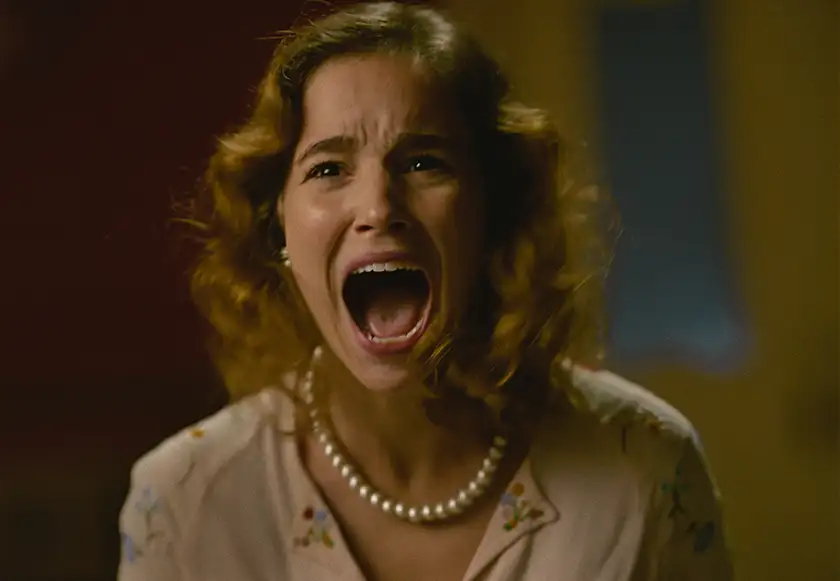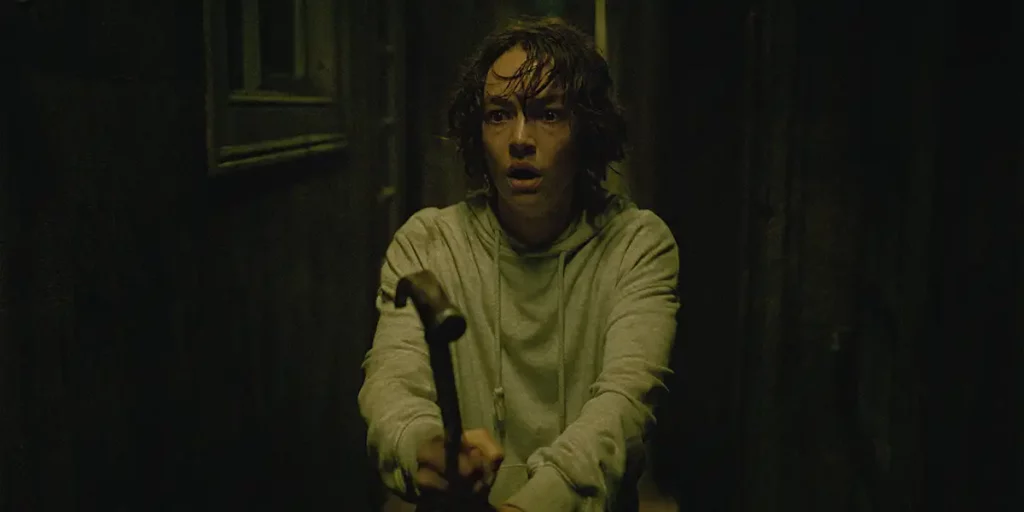Gabriel Abrantes’ Amelia’s Children is a campy but messy Portuguese horror film with weak dialogue and a confused narrative.
How do we determine what makes a “campy” film? Looking at various definitions online and on social media, camp is often viewed as how we find appeal in things that may be poorly made but have immense enjoyment packed into them. Cheesy songs from the 90s and cheaply made horror movies from the 80s are common examples of how we, as consumers, have formulated our love for silliness. With our appreciation for camp, though, an interesting problem has arisen. When we love our media out of irony, what happens when media begin to take notice and edit themselves accordingly? Amelia’s Children is a Portuguese horror film that, for better or worse, leans on the side of camp to the very end.
Amelia’s Children follows Edward (Carloto Cotta) and Riley (Brigette Lundy-Paine), a couple who visit Portugal when Edward’s biological family is discovered. While staying in a beautiful and lavish villa in the Portuguese countryside, the couple immediately begins to note the family’s strange behaviours. As Edward learns the truth about his family, dark secrets begin to be unearthed.
Right when Amelia’s Children begins, it does so with a tribute. Like many horror films before it, we open with the Albertus font, which was made famous through the films of John Carpenter. It’s a small detail, but it’s one that is undeniable in its power to invoke a particular tone. It’s an effective tool, whether it’s a contained chiller like The Thing or something more supernaturally enveloping like In The Mouth of Madness. However, while it may sound strange to fixate on this small detail outside of Carpenter’s filmography, it acts as quite a helpful way to evaluate what exactly Gabriel Abrantes is approaching here through the film.
Amelia’s Children is set in the modern day. We have smartphones with translator apps that help translate both the English and Portuguese languages as well as the general technological hum that comes from us living in the digital landscape. Despite this, Amelia’s Children does not feel like a modern film. It’s clear from the outset that Gabriel Abrantes is channelling multiple eras of horror films here, with the cheesiness of the 80s taking centre stage. There’s an undeniable silliness that is tapped into here, which is where the film shines but also, unfortunately, stumbles.

As our main characters enter this gorgeous villa and are welcomed by loving hospitality, things quickly take a turn when the character of Amelia (Anabela Moreira) makes herself known. Layered under mountains of plastic surgery, intriguingly crafted by the film’s strong use of make-up and a general vibe from Moreira’s performance that is equally strange and uncomfortable, Amelia is where the film has the most fun. It’s clear that Anabela Moreira plays her performance up to the campiest degree. While that means some of the horror is ripped away in some scenes, the general uneasiness that is enhanced by Abrantes’ direction and the uncomfortable performances is when Amelia’s Children is at its strongest.
The cracks in Amelia’s Children begin to show in the overall narrative and how it is delivered to us. There’s an unshakeable feeling here that grows in the third act, where many of the film’s thematic concepts feel shallow as it takes specific narrative routes that are too safe and unmotivated to dig deeper into itself. There’s a strange rhythm to the pacing here as Abrantes seems to follow the standard “slow-burn” structure of modern horror while moving through the story as if it is on 2x speed. Many narrative beats here seem to come in extremely quickly, but don’t take advantage of the extra time given to them. The weirdness of Edward’s family shows as soon as they appear, which leaves the film lacking exciting questions. While the audience may be aware of the strange vibes they see before them, there’s power in letting them simmer in it for a while before pulling the rug out from under them in the final moments.
The core problem with Amelia’s Children stems from the over-commitment of its surreal images while not letting the narrative grow organically. On paper, this organisation of priorities can work, but in the case of this film, it leaves it in a state of having its cake and eating it too. The narrative zips along quickly here, but it also wants to slow down and explain itself when necessary. This constant need to catch up leaves the story feeling undercooked as it rushes and forgets certain vital elements. A lot of the ideas here are structurally sound and leave room for some very unique narrative beats, but by the time we reach the third act, the film takes an overly conventional approach that lacks the punch of the many movies that inspired this one.
Amelia’s Children works best when applying a lot of the campy trappings of horror films onto itself. However, this also contributes to its downfall when many of these moments feel shallow. Despite the relative fun that can be had from the zany tone, the film struggles to keep pace and sacrifices many of its potentially interesting concepts to wrap things up too neatly.
Amelia’s Children will be released in US theaters and on VOD March 1, 2024.

